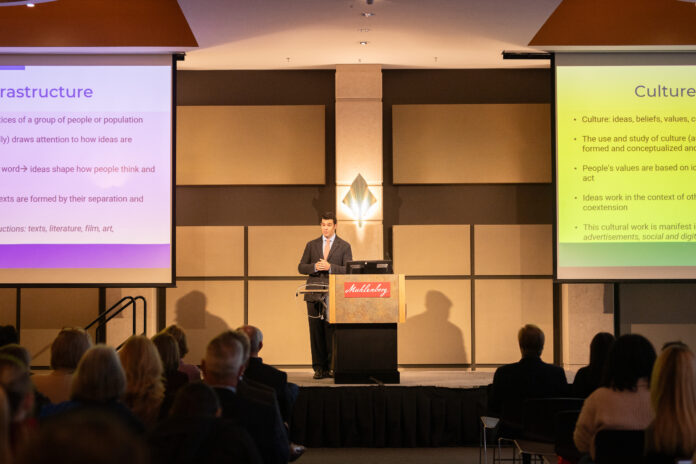
The College welcomed Lorenzo Servitje, Ph.D., M.P.H., to campus to share his recent discoveries in a lecture titled “Dracula, Zombies, and Contemporary Healthcare.” Servitje is currently the director of the Health, Medicine and Society Program and an associate professor of English at Lehigh University. He is the recent author of the book “Medicine is War: The Martial Metaphor in Victorian Literature and Culture” and is the co-editor of three scientific collections. His work ranges from medical militarization in the Victorian period to contemporary medical discourse and representation in the media today. Servitje’s talk was the 39th lecture of the Wallenberg Tribute lecture series, an annual tradition of a public lecture followed by a reserved dinner to honor Raoul Wallenberg and his sacrifices made during World War II.
Servitje began with an explanation for his enticing title choice. “[In the lecture] I’m going to give you a quick case study of what Dracula might tell us about antimicrobial resistance and we’re going to do a quick overview on the evolution of zombies and health sciences and public health. I would like you to think about the infrastructure of healthcare in a very literal sense, but then we’ll also more broadly take a step back from a humanistic, maybe social scientific perspective to think about culture as part of the healthcare industry.”
He broke down the lecture into three digestible sections for the audience. The first section was titled “Foundations,” and included general terms in the healthcare and humanities literature and how the two fields overlap. The second section was titled “Infrastructure of Healthcare,” which explored the integrity of healthcare systems in the United States and the role of culture in this infrastructure. Lastly, Servitje was to discuss “The Time of Monsters: Then and Now,” which connected back to his research topic.
“Health humanities is an interdisciplinary field with the relationship between health and human experience, condition and its cultures,” Servitje explains. He expands on this with the idea that scientific knowledge and the practice of medicine are undoubtedly affected by the human experience and individuality of one another. History also plays an important role in the development of the healthcare industry as a whole. He gave the example of past epidemics giving rise to vaccines due to the human experience of infection and loss during those eras. Servitje then tied the human experience to culture and its role in structuring general healthcare.
“When infrastructure works really well, we don’t think about it until it breaks,” Servitje explains. “For example, if you have good internet connectivity, you don’t need to think about how you got here without any interruption. This is important to help us interrogate the underlying realities of healthcare. I’d now like to invite you to think about how cultural productions are part of the infrastructure that makes up what we think of healthcare as. People’s values are based on ideas about the world and these ideas shape how people think and act. Cultural norms, including media, films, arts etc., and different ways of thinking help shape the changing practices and information of health and medicine amongst the public.”
Servitje concludes this second section of his lecture with a quote from Donna Haraway’s novel “Staying with the Trouble.” “It matters what stories make worlds, and what worlds make stories.”
Sabeen Safi ‘26 found this quote particularly striking, commenting, “The most interesting part of the lecture was a quote he shared by Donna Haraway that stressed the importance of the tools and narratives we use in shaping our understanding of the world. Dr. Servitje studies culture to challenge systemic approaches within healthcare, which is unique.”
Victoria Jordan ‘25 also commented on this section, saying, “I think he did a really good job with building the foundation by explaining how culture and healthcare are infrastructures so the audience could understand how they intertwined to give monsters and zombies such a big impact for describing and explaining struggles in our world.”
For Servitje’s final section of the lecture, he expanded upon the world of monsters as it relates to modern healthcare and popular culture. To preface this topic, Servitje shared a quote from philosopher Antonio Gramsci that stated, “the old world is dying and the new world struggles to be born. Now is the time of monsters.”
“Dracula is a monster that represents the fear of all that is other,” Servitje explains regarding Dracula and his relation to modern microbial resistance. “He is an opportunistic ‘pathogen’ who thrives in the conditions of modernity. He is fought in a very literal sense in past fiction and is metaphorically like a disease, sucking the blood from his victims and turning them into vampires as well.”
He then shifts his focus to the gothic novel of “Jekyll and Hyde,” in which Dr. Jekyll, a kind and well-respected scientist, transforms himself into his evil alter ego named Mr. Hyde. Concerning the healthcare field, this story alludes to the slippery nature of certain biomedical terminologies. “This figure is used to represent this kind of oscillation in one way or the other, but he’s just an average of two differences. And it’s not just that they’re essentially good or bad and doing things the right or wrong way, there’s a lot of gray in between.”
Servitje’s last topic included zombies and their impact on modern-day research. “There’s a long history of zombies with contemporary American culture. The very framing of zombies was thought about in question of both medical and legal jurisprudence.”
He touched on the evolution of zombies in the media over the years. The representation of zombies in the past has coincided with the creation of the term “braindead” and thus gave the public a reference for the condition. Zombies have also been used as a pharmacological metaphor, with certain drugs being used in films to start zombie outbreaks and impair cognitive function in humans. Viral zombies made their way into the media as well as a result of a viral pandemic or bioweapons. His most recent example was from the popular show “The Last of Us,” in which “zombies are ‘real’ in nature and result from parasites or fungal pathogens,” according to Servitje. “There have been a lot of scientific papers after this that started to think about the relationship between positive fibrosis and different aspects of human behavior such as depression and sleep.”
Servitje concluded his unique lecture with one final quote from novelist and poet George Eliot, tying the role of monsters to the development of humans. “The growing good of the world is partly dependent on unhistoric acts; and that things are not so ill with you and me as they might have been, is half owing to the number who lived faithfully a hidden life, and rest in unvisited tombs.”
Matthew '25 is a double major in Biology and French. When he's not in class or writing for the paper, he is usually swimming, skiing, playing volleyball, lifeguarding, or listening to music!






















